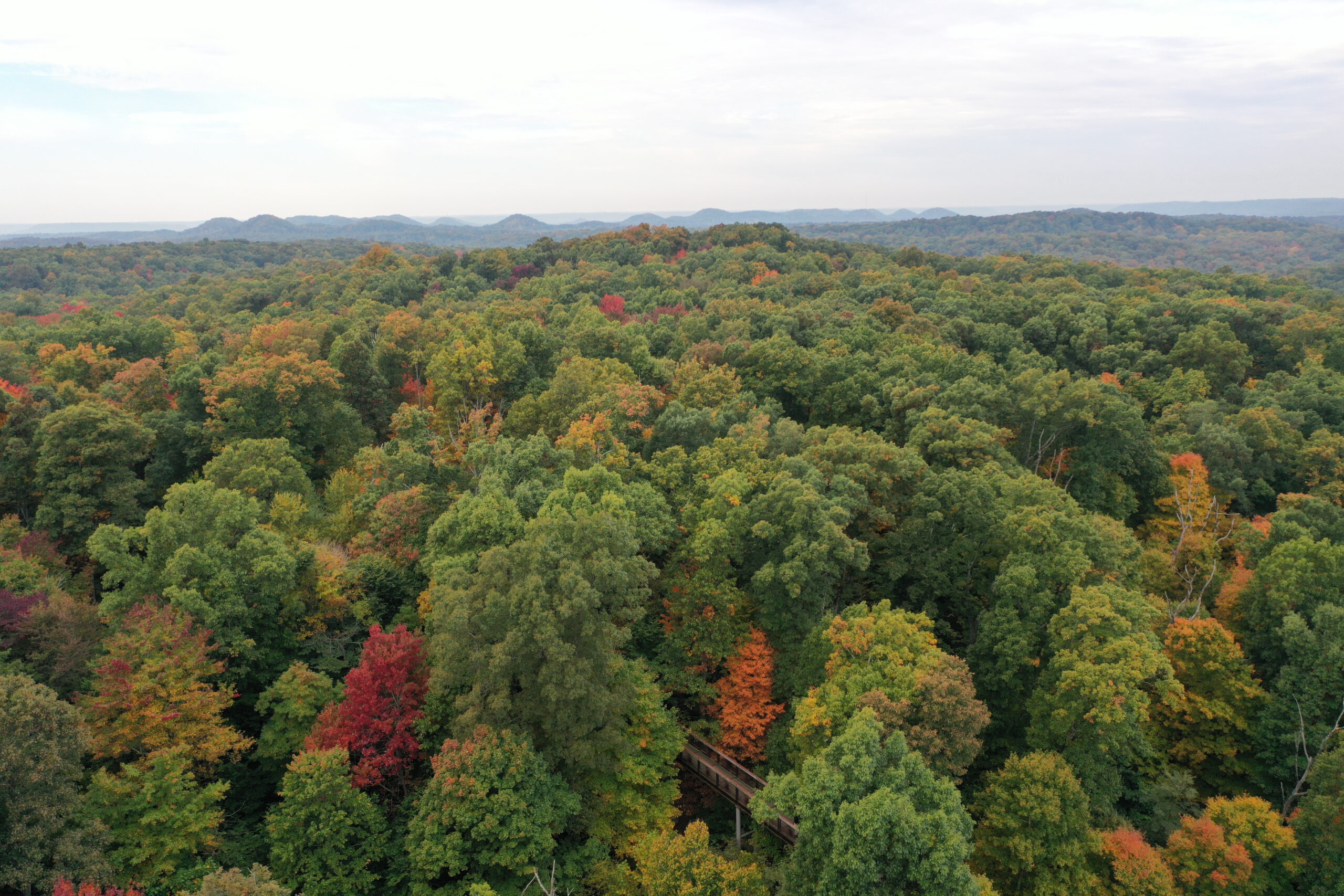By bernheim
CLERMONT, Ky. (May 25, 2022) – Community collaborations in urban agriculture are receiving support through a partnership between the United States Botanic Garden (USBG) and the American Public Gardens Association (Association). Under the third year of the Urban Agriculture Resilience Program, 24 urban agriculture collaborations between public gardens and community partners across 19 states are receiving $440,800, the largest amount awarded through the program to date.
Bernheim Arboretum and Forest is one of the recipients of this award, which will support Youth Development in Nature, an initiative by Bernheim to encourage diverse youth in developing a relationship with nature and choosing green career paths. Youth Development in Nature works in tandem with Bernheim’s partnership with Youthbuild’s Urban Conservation Corps (UCC) program to give both technical and mentoring support to UCC participants choosing horticulture, agriculture, or other fields as a career.
“It’s a huge honor to be recognized by these two incredible organizations giving us this award and we’re grateful for this powerful endorsement of our work,” said Kristin Faurest, Bernheim’s Director of Education. “Sustainable urban agriculture is an area with a tremendous capacity for addressing some of the most critical issues facing us like social inequity, climate change, and poor public health due to food apartheid. We’re proud and happy to be partnering with YouthBuild and Urban Conservation Corps to do good work to improve access to healthy, locally-grown food in Louisville.”
The funds Bernheim will receive will allow it to expand its capacity in this partnership by supporting Bernheim staff in teaching UCC youth onsite at the forest, and at UCC’s urban campus. It also enables UCC to make improvements in its urban farm, which currently includes raised beds, beekeeping facilities, chickens, fruit trees, and other features.
The collaborations will support food growing and education activities in urban communities experiencing food insecurity and strengthen their capacity to engage in urban agriculture. In 2022, 73 organizations will participate in the program, representing a wide range of community partnerships including botanic gardens, arboreta, public schools and school districts, universities, parks and recreation departments, youth organizations, community centers, food banks, health centers, urban farms, community gardens, faith-based organizations, and small businesses.
“We are so happy to continue this program supporting urban agriculture education and food production among public gardens and partnering organizations across the country,” said Saharah Moon Chapotin, USBG executive director. “Growing food is such an important way to build community and resilience as we emerge from the COVID-19 pandemic, and in many food-insecure neighborhoods, having ready access to fresh, nutritious fruits and vegetables is equally critical.”
“We are pleased to partner with the USBG on this effort that results not just in thousands of pounds of food being delivered to urban communities but also in furthering our knowledge so as to create and improve hundreds more partnerships like those who have received these awards,” Association Executive Director D. Casey Sclar said. “It’s simply fantastic! “
The Urban Agriculture Resilience Program began in 2020 as a way for the USBG and the Association to help public gardens continue urban agriculture and food growing programs facing funding and capacity challenges due to COVID-19. Learn more about previous awardees at www.USBG.gov/UrbanAg.
2022 Urban Agriculture Resilience Program Awardees include:
Alaska
● Alaska Botanical Garden, in collaboration with Bowman Elementary School
● Georgeson Botanical Garden, in collaboration with Fairbanks Soil and Water Conservation District, University of Alaska Fairbanks Office of Sustainability, and University of Alaska Fairbanks Vegetable Varieties Program
Arizona
● Desert Botanical Garden, in collaboration with Unlimited Potential, TigerMountain Foundation, Orchard Community Learning Center, and Roosevelt School District
California
● Guadalupe River Park Conservancy, in collaboration with UC Master Gardeners of Santa Clara County, and City of San Jose Parks, Recreation and Neighborhood Services
● Olivewood Gardens and Learning Center, in collaboration with Mundo Gardens
Colorado
● Denver Botanic Gardens, in collaboration with Sun Valley Kitchen and Community Center
Connecticut
● Connecticut College, in collaboration with FRESH New London
Delaware
● The Delaware Center for Horticulture, in collaboration with Food Bank of Delaware and Kingswood Community Center
Florida
● Fairchild Tropical Botanic Garden, in collaboration with Miami-Dade County Public Schools
Illinois
● Garfield Park Conservatory Alliance, in collaboration with Garfield Park Community Council and Chicago Park District
Kentucky
● Bernheim Arboretum and Research Forest, in collaboration with YouthBuild Louisville and Urban Conservation Corps
Michigan
● Matthaei Botanical Gardens and Nichols Arboretum – University of Michigan, in collaboration with Cadillac Urban Gardens (Southwest Detroit Environmental Vision), Growing Hope, Oakland Avenue Urban Farm, Detroit Black Community Food Security Network D-Town Farm, and Keep Growing Detroit
Minnesota
● Minnesota Landscape Arboretum, in collaboration with Carver County Health and Human Services, Scott County Public Health, and River Valley Health Services
Missouri
● EarthDance Organic Farm School, in collaboration with Ferguson-Florissant School District, All Among Us Women’s Care Center, and Blessed Teresa Of Calcutta Food Pantry
New Jersey
● City Green, in collaboration with Clifton Recreation Department
New York
● Mary Mitchell Family and Youth Center, in collaboration with New York Botanical Garden, Morning Glory Community Garden, La Finca del Sur, and Castle Hill Resident Association
● Queens Botanical Garden, in collaboration with Astoria Values
North Carolina
● Cape Fear Botanical Garden, in collaboration with Cumberland County Cooperative Extension Master Gardener Volunteers and Fayetteville Urban Ministry
Pennsylvania
● Grumblethorpe Historic House and Gardens, in collaboration with Awbury Arboretum, Philly Forests, Weavers Way Co-op, and Chef Gail
● Pennsylvania Horticultural Society, in collaboration with Neighborhood Gardens Trust and Furtick Farms
● Phipps Conservatory and Botanical Gardens, in collaboration with Operation Better Block
Tennessee
● Knoxville Botanical Garden and Arboretum, in collaboration with BattleField Farm & Gardens
Utah
● Utah State University Extension, in collaboration with Utah State University Botanical Center
Virginia
● Downtown Greens, in collaboration with Hazel Hill Healthcare Project
###
Online media folder of urban agriculture images from recipient programs
Media contacts: Devin Dotson, U.S. Botanic Garden, (202) 306-6743 or Richard Doran, American Public Gardens Association, (610) 708-3013.
Photo available upon request. Please respond to this email or call (631) 431-3011.
###
About the United States Botanic Garden
The United States Botanic Garden (USBG) is the oldest continuously operating public garden in the United States, created in 1820. The USBG informs visitors about the importance and fundamental value and diversity of plants, as well as their aesthetic, cultural, economic, therapeutic, and ecological significance. With over a million visitors annually, the USBG strives to demonstrate and promote sustainable practices. It is a living plant museum accredited by the American Alliance of Museums and Botanic Gardens Conservation International. www.USBG.gov
About the American Public Gardens Association
The American Public Gardens Association is the leading professional organization for the field of public horticulture. We advance the field by encouraging best practices, offering educational and networking opportunities, and advocating on behalf of our members, our programs and public gardens worldwide. We work together with our members and others to strengthen and shape public horticulture, providing the tools and support industry professionals need to better serve the public while preserving and celebrating plants creatively and sustainably. Since 1940, we have been committed to increasing cooperation and awareness among gardens. Our members include more than 600 institutions, spanning 49 states, the District of Columbia, Canada, and 20 countries. Our members include, but are not limited to, botanic gardens, arboreta, zoos, museums, colleges and universities, display gardens, and research facilities. www.publicgardens.org
About Bernheim Arboretum and Research Forest
Bernheim’s mission is to connect people with nature. Bernheim is the largest privately held contiguous forest block in the eastern United States dedicated to conservation and education. Bourbon maker Isaac Wolfe Bernheim established the arboretum and forest in 1929, as a gift to the people of Kentucky. A recent land acquisition brought the total acreage of land that Bernheim protects to 16,140. Fun, educational programs, diverse tree collections, 40 miles of hiking trails and varied landscapes are available every day except Thanksgiving, Christmas and New Year’s Day. $10 per car donation suggested for non-members.
Bernheim is in Clermont, Ky., about 20 minutes south of the Louisville airport. From I-65 take exit 112 and follow the signs. Bernheim is a non-profit organization that relies on memberships, grants and donations for support. Come visit and enjoy the beauty of nature. For more information, please visit bernheim.org.

